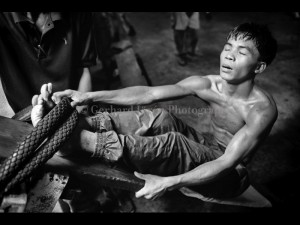
And his recent attempt to reinvent himself is a good sign.
“I am no longer in the vice business. I’ve sold my shares in a big nightclub along with my shares in a Manila casino outlet,” he told reporters. “I do realize I was a weak person before. If I had died the other year, I believe my soul would have ended in hell.”
So many great athletes eventually found themselves trapped in a quagmire of booze, drugs and a self-destructive lifestyle. Pacquiao has now acknowledged that risk.
He won’t be in boxing forever. He’s young, rich and famous. He can do so much more.
As I’ve noted in past columns, I think his decision to enter politics was a bad choice. And I also feel the same way about his decision to become an “ambassador” of the Catholic Church.
Pacquiao may be limiting his post-boxing potential by aligning himself with two powerful, but flawed, institutions – the Philippine Congress and the Catholic hierarchy.
It’s already clear that he’s an odd fit in the House of Representatives. In explaining his positions on say, the reproductive health debate, he has come across as awkward, even inarticulate. Certainly, he is also surrounded by other politicians who are probably even less articulate and coherent.
But clearly, as a congressman, Manny Pacquiao, one of the greatest boxers in history, has been mediocre. He doesn’t stand out the way he did as a sports hero.
It’s not because he’s not smart. Certainly, it takes more than brawn to rise from a flyweight to a super welterweight champion, beating such boxing greats as Oscar de la Hoya and Shane Mosley.
Pacquiao is considered one of the smartest fighters in history. He should also play it smart in mapping out his post-boxing career.
And to do this, I’d argue, he needs to play to his strengths. And a big part of that strength is his own physical strength — and how he attained it against enormous odds..
So here’s one wild idea — one that I think speaks to Pacquiao’s apparent business ambitions and his desire to make a difference.
Why not start a chain of high-end gyms and physical fitness centers catering to the middle class and even upper class customers in the Philippines. He may even expand to the rest of Asia and the United States where he is well-known, even beloved.
He could then use proceeds from that enterprise to open a network of community gyms and fitness centers in working class and poor neighborhoods throughout the Philippines.
Imagine Manny Pacquiao as an advocate for physical fitness and clean living.
What a powerful message he could send to young Filipinos, particularly those from struggling families and communities throughout the archipelago, on the virtues of keeping healthy, and the dangers of smoking, excessive drinking and drugs.
“Iwas kayo sa yosi, toma at droga. Oo, mahirap ang buhay. Pero kung kinaya ko, kaya ninyo rin. .. Life is tough now, but it doesn’t mean you have to destroy yourselves with these vices.”
A photo that circulated on Facebook recently actually gave me this idea: it shows a younger skinny Pacquiao training, doing sit ups.
Can you imagine the kind of discipline and determination the young struggling, impoverished Pacquiao needed to develop his own body and boxing abilities to the point of being able to take on the world’s best fighters?
Pacquiao could eventually become a promoter and train a new generation of great Filipino boxers. But more importantly, he could show young Filipinos that, even if you don’t become a rich boxing icon, being fit and healthy is an ideal goal.
That’s the important lesson he could teach young Filipinos, especially those who cannot afford to become members of fancy gyms and fitness centers.
And he could accomplish this as an independent entrepreneur, an internationally-known Filipino celebrity who sees no need to be tied to any specific institution or arena where he would just be another insignificant, even mediocre, player.
On Twitter @KuwentoPimentel. On Facebook at www.facebook.com/benjamin.pimentel